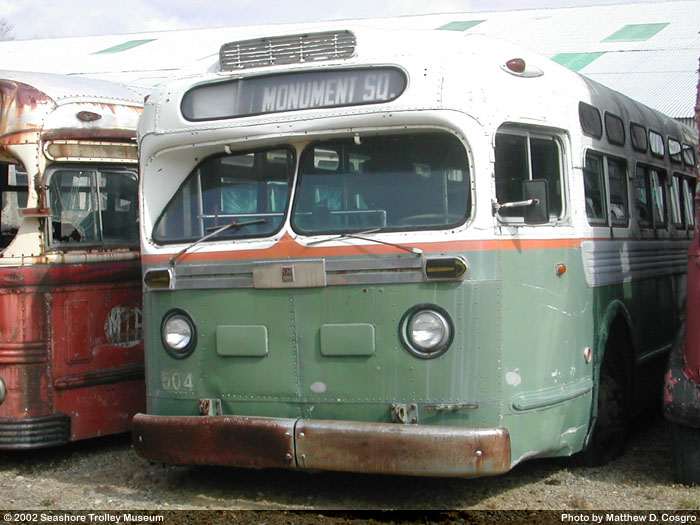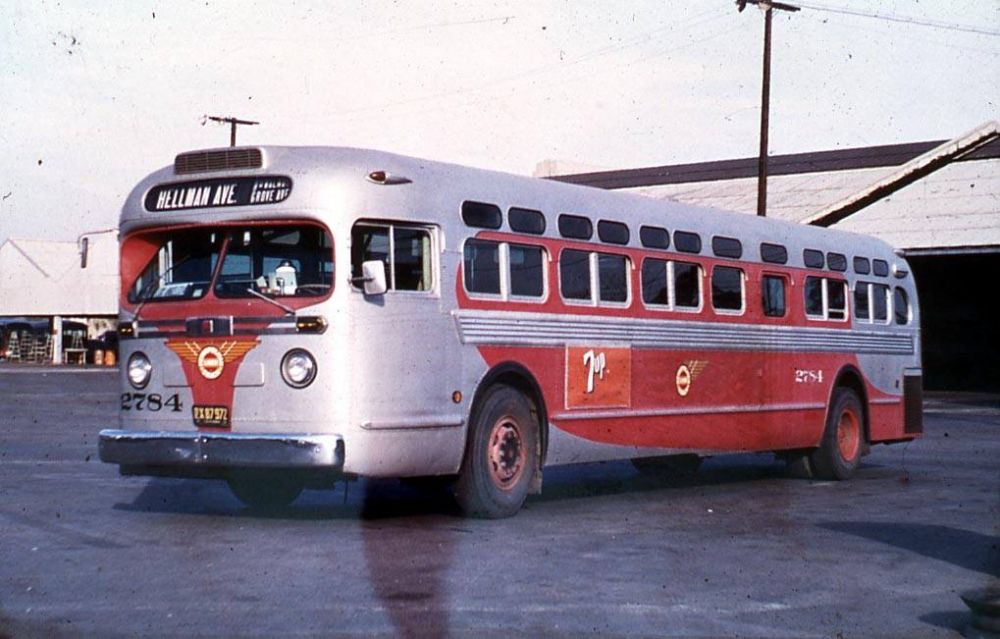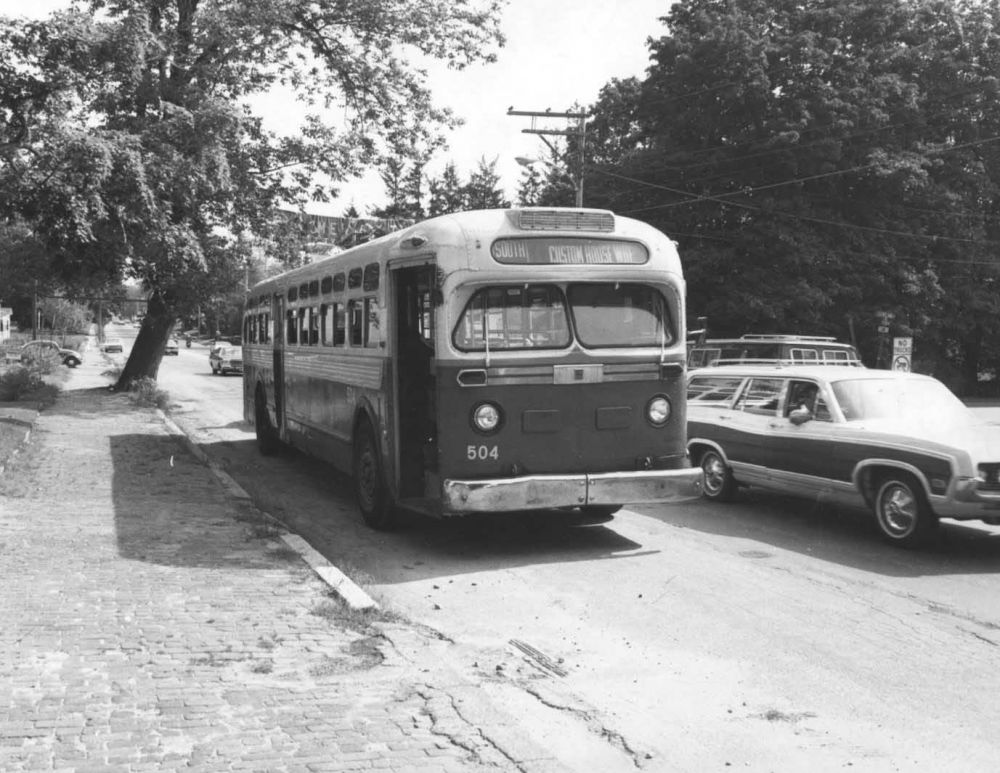
Matthew D. Cosgro
- Builder
- General Motors Corp.
- Description
- 'Old Look' model TDH-5103
- Type
- Motor Buses
- Year
- 1950
- Retired from Service
- 1978
- Acquired by the Museum
- 1978
- Note
- No. 2819 is in the transit bus display area outside the Highwood exhibit barn.
- Fund
- 818
Pacific Electric Ry. 2819
From Los Angeles, California
History
Yellow Coach introduced the streamlined “Old Look” bus design 1940. General Motors acquired Yellow Coach in 1943 and continued the model. About 38,000 “Old Look” buses were built between 1940 and 1969. Most had diesel engines and were used to replace older gasoline buses. Many “Old Look” buses also replaced most of the remaining large streetcar fleets and some trackless trolley fleets as well. “Old Look” buses came in numerous versions and ranged between 25 feet and 41 feet in length. Model TDH-5103 refers to Transit, Diesel engine and Hydraulic transmission. The 51 was the designation for a 40-foot long bus. This model carried 48 passengers.
Pacific Electric Railway (PE) was General Motors’ first customer for the TDH-5103 model. PE acquired 124 of these coaches (Nos. 2701 – 2824) in 1950. The next year, PE bought 65 more model TDH-5103 coaches (Nos. 2825 – 2889).
The Pacific Electric served Southern California and was the world’s largest electric interurban system. Besides interurban lines radiating out from Los Angeles, PE also operated some local streetcar lines in Los Angeles. The PE was controlled by the Southern Pacific, the large, Western railroad. Some of PE’s unprofitable rail lines were replaced with buses beginning in 1917. In 1920, these bus lines were consolidated into the privately-owned Motor Transit Company which expanded throughout Southern California. In 1930, the Pacific Electric acquired Motor Transit and continued to replace rail service with buses. In addition to the Pacific Electric’s service, the Los Angeles Railway (later renamed Los Angeles Transit Lines) operated 3’ 6” gauge streetcar lines in the city. Like the PE, the Los Angeles Railway began replacing its trolley lines with buses in 1922.
In 1953, the PE sold its bus system, as well as its remaining rail passenger service, to Metropolitan Coach Lines, while PE retained its rail freight service. The sale included PE’s 695 buses. Metropolitan Coach Lines was owned by Jesse Hugh. Metropolitan Coach Lines painted its bus fleet in a two-tone green paint scheme, and re-routed some routes onto new freeways. Hugh intended to convert the final rail lines to buses but only partially succeeded with the conversions.
A state agency, the Los Angeles Metropolitan Transit Authority, acquired the transit system in 1958 with its 822 buses as well as the few remaining rail lines. The final interurban rail line ended in 1961. No. 2819 was still operating in Southern California when a new agency, the Southern California Rapid Transit District (SCRTD) took over the transit system in 1964. Los Angeles began operating a new, light rail system in 1990, mostly on former PE corridors.
In 1968, the Greater Portland Transit District (GPTD), in Portland, Maine, acquired 10 model TDH-5103 coaches from SCRTD which became GPTD Nos. 501 – 510. GPTD renumbered No. 2819 to No. 504. The GPTD was formed in 1966 to take over the Portland area transit system from the Portland Coach Company. The city engaged Union Street Railway to operate the bus system. Dale Barrett, who was manager of GPTD and who was previously General Manager of SCRTD, arranged the transfer of the ten TDH-5103 buses. Barrett also arranged the transfer of 40 TDH-5103 buses from SCRTD to the Salt Lake City transit system where he also was a manger. In 1969, the GPTD was renamed the Greater Portland Transportation Company, which operated as “Metro” beginning in 1976. Some of Portland’s No. 501 series buses also operated in Manchester, NH for a few months.
The Seashore Trolley Museum purchased No. 504 from the Greater Portland Transportation Company for $600 in 1978. No. 504 joins four other Portland, ME buses at Seashore: Nos. 4, 310, 700 and 8801. Los Angeles is also represented at Seashore by Los Angeles Railway streetcar No. 521 and by Pacific Electric streetcar No. 680.
Technical Information
- Seats: 48
- Engine: Detroit Diesel 6-71 inline
- Tires: 11.00 x 20
Weight and Dimensions
- Length: 40’ 10.00"
- Width: 102.00"
- Height: 9’ 8.50"
Additional Images

Sister bus #2748 of Pacific Electric Ry. by Jerry Suire and Motor Bus Society Collection

#504 on Congress St. in Portland ME by Jerry Suire and Motor Bus Society Collection
© 1998 - 2025 New England Electric Railway Historical Society. All Rights Reserved.